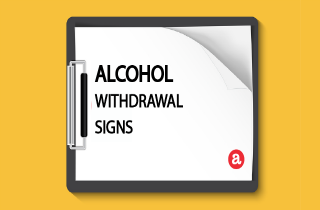Alcohol withdrawal signs usually manifest after a period of alcohol dependence and are related to missing a drink. But when should you seek medical intervention for alcohol withdrawal? What can go wrong and how are these signs treated? We review here, and invite your questions about what alcohol withdrawal feels like or the signs of early and late acute withdrawal from alcohol at the end.
Signs of alcohol withdrawal
Alcohol withdrawal signs usually occur within 8 hours after the last drink, but can occur up to days later. How long alcohol withdrawal lasts usually depends on your past drinking patterns and individual factors related to your medical history. But in general, these signs usually peak by 24 – 72 hours, perhaps persisting for weeks in some cases. Signs of alcohol withdrawal include:
- anxiety or nervousness
- depression
- fatigue
- headache
- insomnia (sleeping difficulty)
- irritability
- jumpiness or shakiness
- mood swings
- nausea and vomiting
- nightmares
- not thinking clearly
- rapid heart rate
- sweating
- tremor of the hands or other body parts
Other, less serious signs may include:
- clammy skin
- enlarged (dilated) pupils
- loss of appetite, pallor
First signs of alcohol withdrawal
Any elevation in heart rate, blood pressure, or temperature, in any combination, after a period of regular high levels of drinking is suggestive of the “Alcohol Withdrawal Syndrome”. A physical examination may also reveal tremulousness, diaphoresis, flushing, and hyper-reflexia. The initial stages of alcohol withdrawal can occur as early as 8 hours after the last drink and usually involve measurable autonomic changes.
Early signs of alcohol withdrawal
In most cases, although patients in the early stages of withdrawal experience prominent anxiety and physical discomfort, they do not exhibit gross impairment in orientation or attention, and they do not report perceptual disturbances. The presence of confusion, an altered level of alertness, or hallucinations usually signals a more advanced (and dangerous) stage of alcohol withdrawal and manifest about 36-48 hours after the last drink.
Late signs of alcohol withdrawal
If inadequately treated in its initial stages, severemalcohol withdrawal can lead to life-threatening complications within a matter of hours. These complications can be especially severe for a patient in the general hospital setting who is already compromised by active medical conditions.
Generalized seizures (“rum fits”), if present, usually occur within the first 2 days of alcohol withdrawal. In severe cases, seizures may continue for longer periods. In addition to placing a patient at risk for mechanical injury and aspiration, continuous seizures can cause irreversible excitotoxic injury to brain tissue.
Signs and symptoms of alcohol withdrawal treatment
Alcohol withdrawal is a serious condition that can rapidly become serious, especially if you have been drinking large quantities of alcohol for a period of a few months or longer. In fact, how you withdraw from alcohol is related to your level of alcohol dependency.
Call your health care provider or go the emergency room ANY TIME you think you might be experiencing alcohol withdrawal, especially if you were using alcohol often and recently stopped. Call for an appointment with your health care provider if symptoms persist after treatment.
Antipsychotic medications such as haloperidol may sometimes be needed for persons with severe psychotic symptoms, especially if they have an underlying problem such as schizophrenia. However, these drugs should be avoided if possible because they may contribute to seizures. Other symptoms such as agitation, seizures, and irregular heartbeat are treated with the following medications:
- Sedatives such as diazepam or lorazepam
- Anticonvulsants such as Phenobarbital
Signs of withdrawal from alcohol questions
Do you still have questions about the signs of alcohol withdrawal? Please leave your questions in the comments section below. We do our best to respond to all legitimate queries with a personal and prompt response.









Related Posts